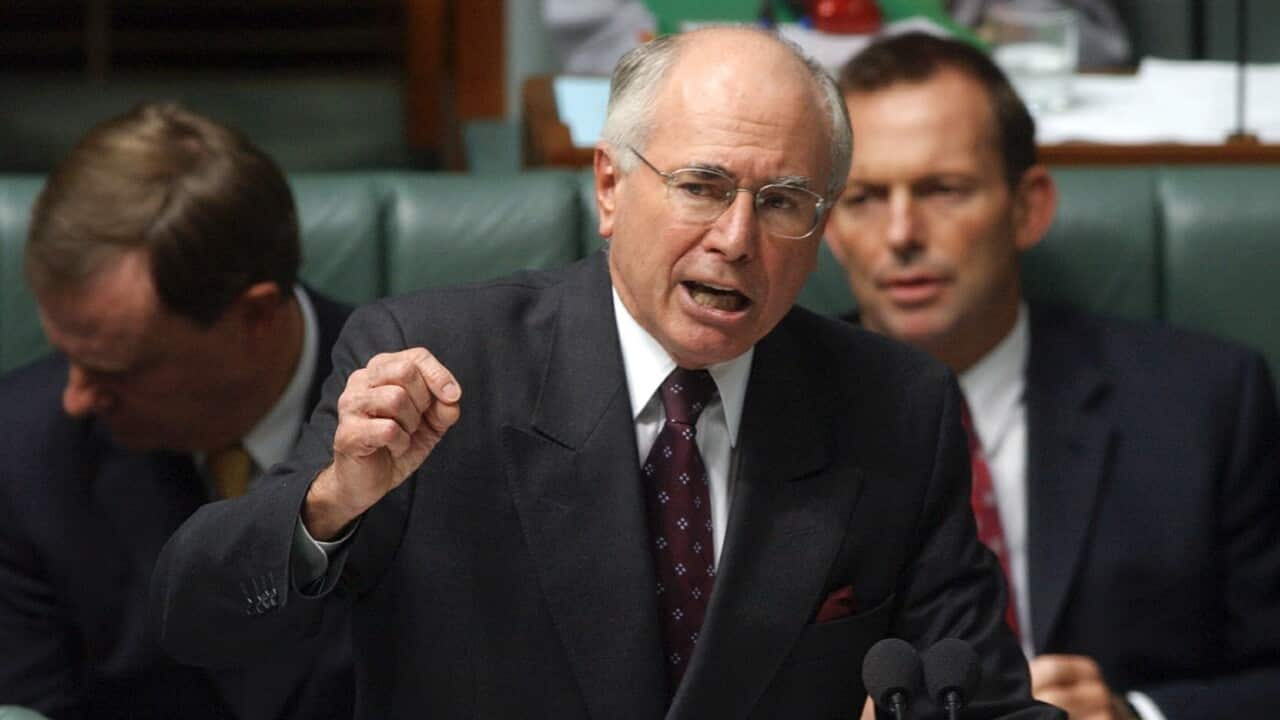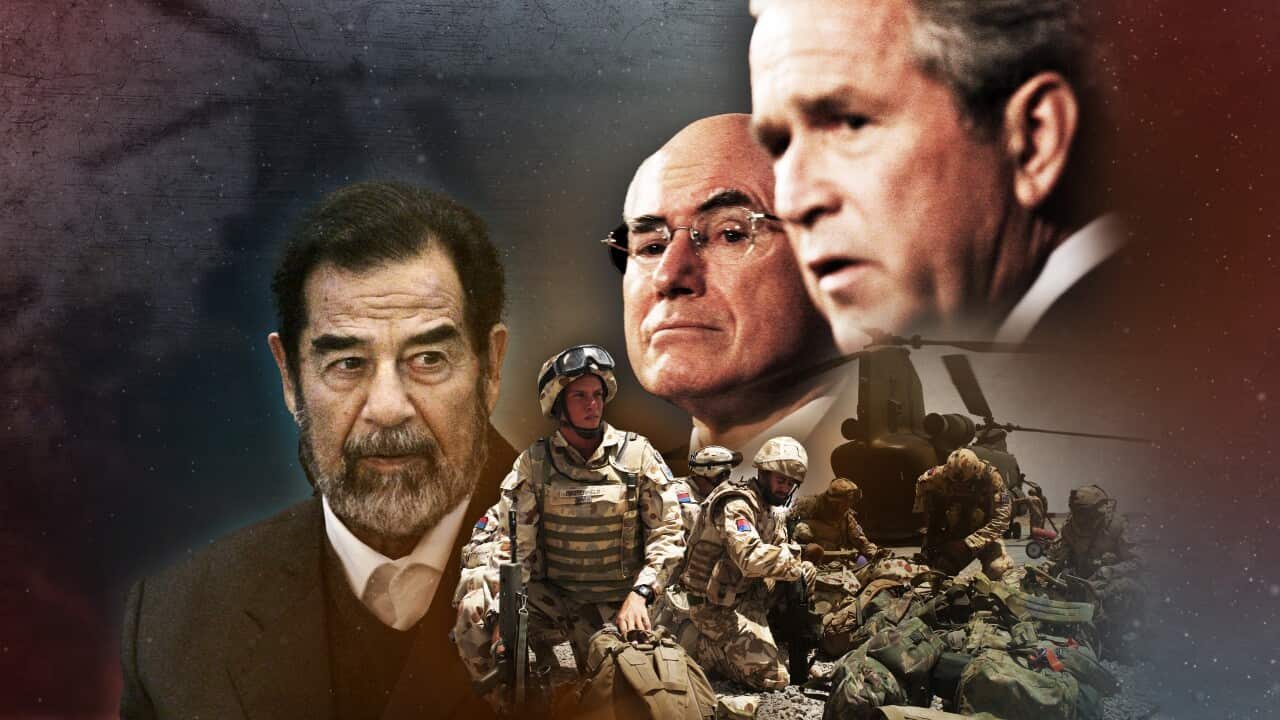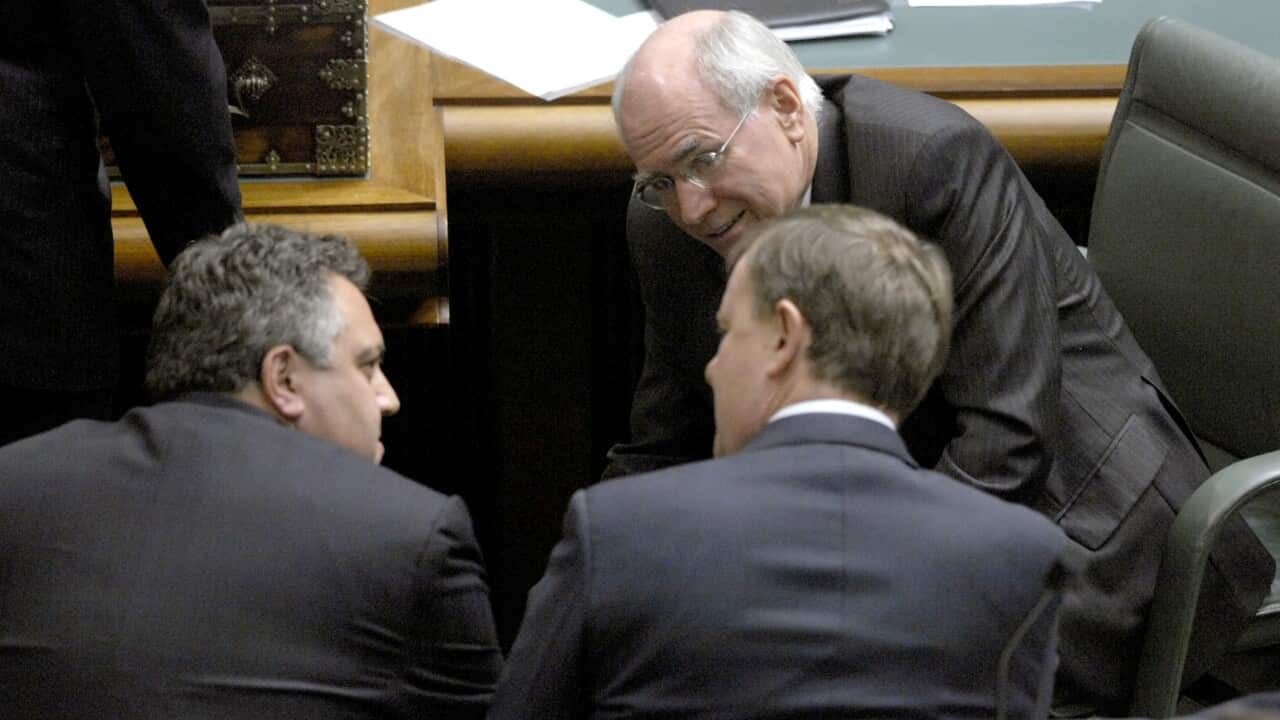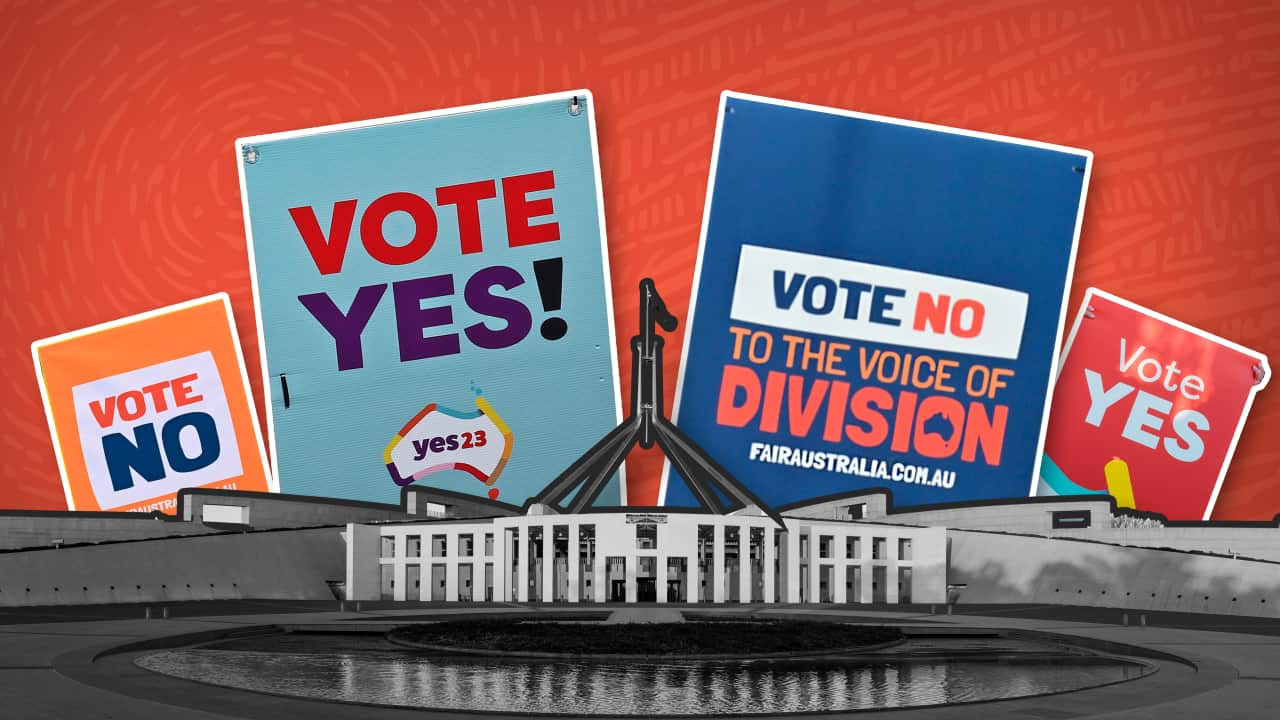The year 2004 witnessed one of Australia's most successful Olympic campaigns, with national icon Ian Thorpe bringing home two golds in the pool in Athens.
It was also a big year for then-prime minister John Howard, who had won his fourth election.
But not everything was going swimmingly for the man who would become the second-longest-serving prime minister in Australian history.
Domestically, Howard was facing an Australia divided over the Iraq war, with news of human rights abuses by US soldiers abroad further fuelling anti-war protests.

In 2004, John Howard (right) was re-elected as prime minister and swimmer Ian Thorpe won four Olympic medals for Australia, including two gold. Source: AAP / Tracey Nearmy
The Iraq invasion and weapons of mass destruction
The British government's Butler Review found the intelligence claiming that Iraq possessed weapons of mass destruction (WMD) was unreliable.
Howard defended his decision to commit troops to Iraq, despite the justification for joining forces with the US to invade Iraq evaporating.
He said that, while he knew attempts to "locate physical stockpiles had not been successful", there was still evidence of the capability to manufacture WMD.
"I never had any doubt that the capacity to make them existed, and that the evidence that verified that was plentiful, but the actual physical stockpile, it was obvious in the lead up to the formal announcement that that was going to come," he told SBS News.
"And it was disappointing, but, and it was a setback, and it allowed enemies of our decision to renew their attack. But that's how it goes."
In an unsealed letter to Howard, then-defence minister Robert Hill also considered it in Australia's best interests to continue efforts in Iraq to help stamp out extremism in the region.
"Political reform in the Middle East would, in turn, help the long-term reduction of extremism, and its offshoot, Islamic-based international terrorism," Hill wrote to Howard in February 2004.
However, images of the US Army and the Central Intelligence Agency torturing and sexually abusing detainees in Abu Ghraib prison in Iraq, stoked opposition to the conflict.
"It was damaging, because as a society, we don't approve and we don't support, we oppose very strongly the humiliation of prisoners in our custody in the long term," Howard said.
East Timor bugging scandal
In 2004, Australia's intelligence agencies were accused of bugging the East Timorese cabinet room in an alleged attempt to overhear negotiations over the multi-billion dollar Timor Sea oil and gas treaty.
Twenty years on, when asked if he endorsed the agencies' actions, Howard said he believes they were working in the national interest.
"I had such confidence in our intelligence agencies that I believe they would always act in a manner that promoted Australia's national interest," he said.
"Would that include, if required, in the national interest, an action like that?" asked SBS political correspondent Anna Henderson, referring to the bugging of a foreign government.
"Well, I said, what I said, I always thought they adhere to the national interest," Howard replied.
While the documents are heavily redacted, historian David Lee said there's no evidence it was a matter considered by cabinet.
"There is no mention that I have seen from these papers about that issue," he said.
Howard-Latham handshake
Howard's socially conservative government went to the polls, campaigning on the domestic agenda.
"I thought the economic policies we followed were very good," he said.
"That's why we were able to help Indonesia at the time of the tsunami. Australia would not be in a position to do that now, not as responsibly."
During the 2004 election campaign against Labor's wildcard Mark Latham, a somewhat iconic photo was captured of Latham trying to intimidate Howard.

Former prime minister John Howard (pictured with his back towards the camera) and then-Opposition leader Mark Latham shake hands as they cross paths at the ABC studios during the 2004 election campaign trail. Source: AAP / Mick Tsikas
Changes to the Marriage Act
In 2004, the government amended the Marriage Act to specify that it was "the union of a man and a woman".
In the same year that parts of Europe, the US and Canada legalised same-sex marriage, the amendment also outlawed the recognition of those overseas marriages.
Howard dismissed claims that the changes prejudiced the debate both locally and abroad, stating they reflected the views on marriage at the time.
"We had a choice: the parliament of Australia could define marriage, or it could be left to a judge," Howard told reporters at the NAA briefing in December.
"The way to fix it was to get in first, to lay down the definition, and the definition we put in reflected the view of the government at the time."
The records released by the NAA show the Commonwealth had received a letter from the attorney-general with advice on amending the law, after he examined newly passed ACT legislation allowing same-sex couples to become adoptive parents.
The Marriage Act was amended to allow same-sex marriage in 2017.
Disbanding ATSIC
It was in 2004 that the government moved to disband the Aboriginal and Torres Strait Islander Commission (ATSIC) — a group of elected Indigenous representatives.
Its elected commissioner, Geoff Clark, was embroiled in a scandal, and there were questions about whether ATSIC had too much power over Indigenous-specific spending.
The decision to disband ATSIC came against the backdrop of the Redfern riots in Sydney, with people protesting the treatment of First Australians following the death of 17-year-old Indigenous teen Thomas Hickey.
Howard stands by the decision to disband Australia's longest-running Indigenous affairs department.
"ATSIC had not worked, and it was a bipartisan decision to abolish ATSIC.
"I don't think the solution to Aboriginal Affairs lies in creating institutions and gesture politics. I think you have to bridge the gap in a practical way."













